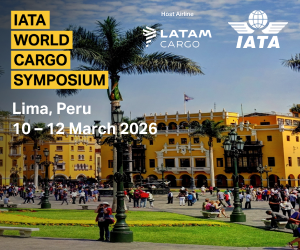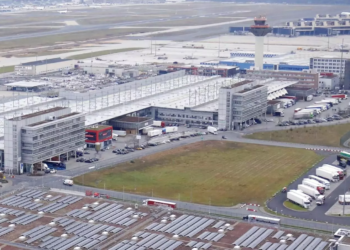Digitalization, Sustainability, and Safety & Security at Top of WCS 2025 Agenda
Air cargo was a standout performer in 2024, growing 11.3% — outpacing passenger demand. E-commerce expansion and disruptions in sea shipping kept demand high, with yields 39% above 2019 levels. Looking ahead, 2025 is set for another 5.8% growth, but challenges loom: geopolitical uncertainty, inflation, and potential U.S. policy shifts, including new tariffs.
These pressing issues will take center stage at the IATA World Cargo Symposium (WCS) 2025 in Dubai from the 15-17 April. Industry leaders will explore how air cargo can navigate an increasingly complex global trade environment. The symposium will feature plenary sessions, specialized tracks, workshops, and executive summits, addressing:
Digitalisation: Transforming Air Cargo for the E-Commerce Era
The rapid rise of e-commerce is reshaping the air cargo industry. Currently accounting for 20% of air freight, e-commerce is projected to grow to at least a third of all cargo shipments. With the sector expected to reach $8 trillion by 2027, air cargo operators must adopt digital innovations to remain competitive.
At the World Cargo Symposium (WCS), industry leaders will explore how digital solutions are driving efficiency and transformation. Keynotes will discuss the implementation of digital strategies, followed by a fireside chat on IATA’s Digitalization Leadership Charter, which has garnered 17 signatories as of December 2024.
A pivotal panel will address the challenges and opportunities surrounding the adoption of ONE Record by January 1, 2026—a significant step toward data standardization. Spotlight sessions will highlight AI-driven innovations, data transparency, and workflow optimization, all of which are crucial for enhancing operational accuracy and efficiency.
Sustainability: Decarbonizing the Air Cargo Industry
Sustainability is a pressing priority for air cargo, with half of all shipments transported on passenger aircraft. Reducing carbon emissions, minimizing single-use plastics, and optimizing cargo space are key strategies to achieve greener operations. Circularity initiatives, including recycling Unit Load Devices (ULDs) and increasing the use of Sustainable Aviation Fuel (SAF), are gaining traction.
WCS 2025 will feature:
- A keynote on accelerating SAF adoption.
- A panel discussion on CO₂ reduction strategies.
- Sessions on mitigating sustainability risks in the supply chain, leveraging data-driven innovations, and promoting circularity in operations.
- A dedicated spotlight on sustainable pharmaceutical logistics, tackling industry challenges and best practices.
Real-world case studies will cap off the discussions, offering actionable insights on improving transparency in environmental reporting and social impact assessments.
Risk & Resilience: Addressing Global Uncertainty
Geopolitical shifts continue to create volatility in the air cargo sector. U.S. tariffs could lead to short-term surges in demand, mirroring the trends seen during the 2018–2019 U.S.-China trade war. December air cargo rates from Asia to the U.S. have already risen by 8%, according to IATA data.
However, long-term disruptions could result in higher costs, weakened demand, and a shift toward regional sourcing or ocean freight alternatives. Stricter e-commerce regulations, including potential changes to de minimis exemptions, may further complicate cross-border trade.
At WCS 2025, industry experts will examine strategies to navigate these challenges, focusing on:
- Adapting to evolving trade policies and regulatory environments.
- Strengthening supply chain security amidst growing global threats.
- Enhancing operational resilience in response to shifting market conditions.
Workshops: Shaping the Future of Air Cargo
To support industry advancement, WCS 2025 will offer workshops covering key topics such as:
- Future Talent Development: Training the next generation of leaders through the Future Air Cargo Executives Summit (FACES).
- Competency-Based Training: Enhancing safety and performance via IATA’s CBTA Center.
- Market Optimization: Improving segment performance through IATA CEIV programs for Pharma, Live Animals, Lithium Batteries, and Fresh Cargo.
- Cargo Solutions: Utilizing IATA tools for better decision-making, compliance, and efficiency.
- E-Commerce Forum: Bridging the gap between e-retailers and cargo operators to enhance logistics visibility.
- ULD Forum: Exploring AI applications in ULD design and sustainability data collection.
The Road Ahead: Collaboration is Key
The future of air cargo hinges on strong collaboration among airlines, logistics providers, technology firms, regulators, and shippers. Dubai, a global logistics hub, provides the ideal venue for these critical conversations.
As IATA, Emirates SkyCargo, and dnata host WCS 2025, the industry will focus on driving innovation, improving efficiency, and reinforcing air cargo’s role in global trade. The symposium is more than just an event—it’s a strategic platform that will shape the future of the industry.
The question is not whether air cargo can adapt, but how swiftly it can evolve to meet new global challenges. The answer will define its trajectory for years to come





